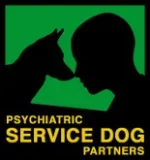Presented by Marion Gwizdala
Please circulate the following message as widely as appropriate. If you received this message as a forward and would like to receive information directly from Advocates for Service Animal Partners, please become a partner.
This information is provided by Advocates for Service Animal Partners. It is intended as informal guidance only and should not be construed as legal advice. For more information, you may contact
Advocates for Service Animal Partners (ASAP)
386-ASAP411 (386-2727411)
Advocacy411@gmail.com
One of the frequent questions asked on Advocates for Service Animal Partners’ service animal hotline (855-ASAP211) is whether or not a service animal handler can be required to provide documentation that a service animal has been vaccinated as a condition of access. A casual search of online resources does little to answer this question due to the misinformation found from what might seem to be reliable sources.
This guidance will address the question of vaccinations as a condition of access to assist those developing policies and best practices governing access to disabled individuals accompanied by service animals.
This brief is not meant to be an exhaustive presentation of the rights and responsibilities of covered entities but as guidance on the specific issue of vaccination requirements as a condition of access. For more detailed information, please visit ASAP’s website or the website of the United States Department of Justice at https://ada.gov.
WHAT PLACES ARE COVERED
The provisions of the Americans with Disabilities Act (ADA) apply to both public (state and local governmental) entities and private entities providing public accommodations – titles II and III, respectively. For convenience, this guidance will cite Title III and its implementing regulations, as the language in the applicable provisions is generally identical.
The ADA defines twelve broad categories of private entities providing public accommodations as “Covered Entities”. They include hotels, restaurants, retail establishments, schools, healthcare facilities, fitness centers, and professional offices. 42 USC 12181(7)(A-L). In short, if a business invites the public into its space, it is likely a place of public accommodation. Places of public accommodation are required to modify their policies, practices, and procedures to allow an individual with a disability the same access to its goods and services accompanied by a service animal as other patrons. 28 CFR § 36.302(c)(1).
WHAT IS A SERVICE ANIMAL?
The implementing regulations of the Americans with Disabilities Act define a service animal as “any dog that is individually trained to do work or perform tasks for the benefit of an individual with a disability”. 28 CFR § 36.104. In some cases, a service animal may also be a miniature horse. 28 CFR § 36.302(c)(9). Service animals are not pets and any policies that apply to pets do not apply to service animals. The service animal must be kept under the handler’s direct control and must be kept on a leash or tether unless doing so would interfere with the tasks or work the animal was trained to perform (28 CFR § 36.302(c)(4)). Places of public accommodation may not restrict an individual accompanied by a service animal from any place other guests are generally allowed (28 CFR § 36.302(c)(7)).
HOW TO DETERMINE WHAT IS A SERVICE ANIMAL
The Department of Justice has given clear guidance about determining if a dog is a service animal or a pet through “credible assurance”. This guidance states that a place of public accommodation may ask an individual if the dog is required because of a disability and what work or tasks the dog is trained to perform. 28 CFR § 36.302(c)(6). An essential element of credible assurance is not only the answers to the questions but the believability (credibility) of the answers.
Is it believable that the dog is a trained service dog? Does it rest quietly beside the person or does it seem anxious or jittery? Is it under the handler’s control or does it greet other people and seem distracted by the environment? In other words, are the answers to the questions and the behavior of the dog believable that the dog is a trained service dog and will behave appropriately in public? Remember, service animal handlers and the businesses they patronize have mutual rights and responsibilities. Even a service dog may be excluded under certain circumstances.
EXCLUDING A SERVICE ANIMAL
The right to be accompanied by a service dog is not absolute! It carries with it certain responsibilities and businesses can exclude even a service dog under certain conditions. For instance, if a service dog is allowed to arbitrarily greet others without permission or acts aggressively toward other patrons or another service dog and the handler does not take effective measures to correct the misbehavior, a business has the right to exclude that dog. Similarly, if a dog takes products off the shelf of a retail establishment and the handler does not correct the behavior, a business has the right to exclude that service dog. As an aside, the Department of Justice categorically states that service dogs should not be allowed to ride in shopping carts. Frequently Asked Questions about Service Animals, Q31. If a business determines a service animal should be excluded, it should document the reasons for such an exclusion through either a detailed contemporaneous note or – even better - by creating a video recording of the animal’s behavior prompting this exclusion. Such documentation would be very helpful should a formal complaint be filed against the business.
VACCINATIONS AS A CONDITION OF ACCESS
The DOJ offers clear guidance prohibiting the requirement to provide documentation as a condition of access. The implementing regulations categorically state, “A place of public accommodation shall not require documentation”. 28 CFR § 36.302 (c)(6). It is essential to note the words “shall not” used in this phrase is an imperative, meaning it is obligatory, as opposed to “may not” which would be discretionary. Though this section offers the example of documentation that shall not be required to include proof that the
animal has been trained, this is not meant to be an exhaustive set of examples. On numerous occasions, the DOJ has affirmed this position in its settlement agreements by stating, “a place of public accommodation shall not charge a person with a disability any extra fee or ask a person with a disability to comply with any additional condition of service because they are accompanied by a service animal even if an extra fee or charge or condition of service is required for a pet.” United States v. Claremore VFW Post and Auxiliary 297, DJ No. 202-59N-58 and United States v. Delran Township School District DJ No. 204-48-284.
Requiring proof an animal has been vaccinated is considered by the DOJ to be a form of documentation and a condition of service that shall not be required. Some public accommodations have asserted that the DOJ does not exempt service animals from municipal registrations or vaccination requirements and, as such, they have the right to ask for such proof; however, the Department of Justice’s guidance is not intended for public accommodations to be the enforcement agency for these requirements. Since the requirement to produce vaccination records would violate the implementing regulation prohibition of documentation while imposing an additional condition of service, a place of public accommodation cannot require vaccination records as a condition of access.
SUMMARY
Public entities (state and local governments) and private entities providing public accommodations are required to modify their policies, practices, and procedures to allow an individual with a disability accompanied by a service animal the same access to its goods and services as other patrons or guests, as relevant. The animal must be under the direct control of the handler by means of a harness, leash, or tether unless a harness, leash, or tether would interfere with the work or tasks the animal is trained to perform. Covered entities are allowed to make inquiries about the training and the work or tasks the animal is trained to perform; however, no documentation may be required as a condition of access. A covered entity may not impose a surcharge or require an individual accompanied by a service animal to comply with any other conditions of access. Requiring proof of vaccinations would violate both prohibitions of documentation and other conditions of access.
Advocates for Service Animal Partners provides information and intervention
services to service animal handlers and the places they patronize to apply the
Americans with Disabilities Act and its implementing regulations as it pertains to access to individuals accompanied by service animals. These services include policymaking and best practices consultation, as well as in-depth training of staff with direct community engagement. For more information about the mutual rights and responsibilities of service animal handlers and the businesses they patronize, as well as more information about other services provided by Advocates for Service Animal Partners, please contact
Advocates for Service Animal Partners Inc.
Office: 386-ASAP411 (386-272-7411)
Hotline: 855-ASAP211 (855-272-7211)
Advocacy411@gmail.com
 serviceanimals.info
serviceanimals.info
Please circulate the following message as widely as appropriate. If you received this message as a forward and would like to receive information directly from Advocates for Service Animal Partners, please become a partner.
This information is provided by Advocates for Service Animal Partners. It is intended as informal guidance only and should not be construed as legal advice. For more information, you may contact
Advocates for Service Animal Partners (ASAP)
386-ASAP411 (386-2727411)
Advocacy411@gmail.com
One of the frequent questions asked on Advocates for Service Animal Partners’ service animal hotline (855-ASAP211) is whether or not a service animal handler can be required to provide documentation that a service animal has been vaccinated as a condition of access. A casual search of online resources does little to answer this question due to the misinformation found from what might seem to be reliable sources.
This guidance will address the question of vaccinations as a condition of access to assist those developing policies and best practices governing access to disabled individuals accompanied by service animals.
This brief is not meant to be an exhaustive presentation of the rights and responsibilities of covered entities but as guidance on the specific issue of vaccination requirements as a condition of access. For more detailed information, please visit ASAP’s website or the website of the United States Department of Justice at https://ada.gov.
WHAT PLACES ARE COVERED
The provisions of the Americans with Disabilities Act (ADA) apply to both public (state and local governmental) entities and private entities providing public accommodations – titles II and III, respectively. For convenience, this guidance will cite Title III and its implementing regulations, as the language in the applicable provisions is generally identical.
The ADA defines twelve broad categories of private entities providing public accommodations as “Covered Entities”. They include hotels, restaurants, retail establishments, schools, healthcare facilities, fitness centers, and professional offices. 42 USC 12181(7)(A-L). In short, if a business invites the public into its space, it is likely a place of public accommodation. Places of public accommodation are required to modify their policies, practices, and procedures to allow an individual with a disability the same access to its goods and services accompanied by a service animal as other patrons. 28 CFR § 36.302(c)(1).
WHAT IS A SERVICE ANIMAL?
The implementing regulations of the Americans with Disabilities Act define a service animal as “any dog that is individually trained to do work or perform tasks for the benefit of an individual with a disability”. 28 CFR § 36.104. In some cases, a service animal may also be a miniature horse. 28 CFR § 36.302(c)(9). Service animals are not pets and any policies that apply to pets do not apply to service animals. The service animal must be kept under the handler’s direct control and must be kept on a leash or tether unless doing so would interfere with the tasks or work the animal was trained to perform (28 CFR § 36.302(c)(4)). Places of public accommodation may not restrict an individual accompanied by a service animal from any place other guests are generally allowed (28 CFR § 36.302(c)(7)).
HOW TO DETERMINE WHAT IS A SERVICE ANIMAL
The Department of Justice has given clear guidance about determining if a dog is a service animal or a pet through “credible assurance”. This guidance states that a place of public accommodation may ask an individual if the dog is required because of a disability and what work or tasks the dog is trained to perform. 28 CFR § 36.302(c)(6). An essential element of credible assurance is not only the answers to the questions but the believability (credibility) of the answers.
Is it believable that the dog is a trained service dog? Does it rest quietly beside the person or does it seem anxious or jittery? Is it under the handler’s control or does it greet other people and seem distracted by the environment? In other words, are the answers to the questions and the behavior of the dog believable that the dog is a trained service dog and will behave appropriately in public? Remember, service animal handlers and the businesses they patronize have mutual rights and responsibilities. Even a service dog may be excluded under certain circumstances.
EXCLUDING A SERVICE ANIMAL
The right to be accompanied by a service dog is not absolute! It carries with it certain responsibilities and businesses can exclude even a service dog under certain conditions. For instance, if a service dog is allowed to arbitrarily greet others without permission or acts aggressively toward other patrons or another service dog and the handler does not take effective measures to correct the misbehavior, a business has the right to exclude that dog. Similarly, if a dog takes products off the shelf of a retail establishment and the handler does not correct the behavior, a business has the right to exclude that service dog. As an aside, the Department of Justice categorically states that service dogs should not be allowed to ride in shopping carts. Frequently Asked Questions about Service Animals, Q31. If a business determines a service animal should be excluded, it should document the reasons for such an exclusion through either a detailed contemporaneous note or – even better - by creating a video recording of the animal’s behavior prompting this exclusion. Such documentation would be very helpful should a formal complaint be filed against the business.
VACCINATIONS AS A CONDITION OF ACCESS
The DOJ offers clear guidance prohibiting the requirement to provide documentation as a condition of access. The implementing regulations categorically state, “A place of public accommodation shall not require documentation”. 28 CFR § 36.302 (c)(6). It is essential to note the words “shall not” used in this phrase is an imperative, meaning it is obligatory, as opposed to “may not” which would be discretionary. Though this section offers the example of documentation that shall not be required to include proof that the
animal has been trained, this is not meant to be an exhaustive set of examples. On numerous occasions, the DOJ has affirmed this position in its settlement agreements by stating, “a place of public accommodation shall not charge a person with a disability any extra fee or ask a person with a disability to comply with any additional condition of service because they are accompanied by a service animal even if an extra fee or charge or condition of service is required for a pet.” United States v. Claremore VFW Post and Auxiliary 297, DJ No. 202-59N-58 and United States v. Delran Township School District DJ No. 204-48-284.
Requiring proof an animal has been vaccinated is considered by the DOJ to be a form of documentation and a condition of service that shall not be required. Some public accommodations have asserted that the DOJ does not exempt service animals from municipal registrations or vaccination requirements and, as such, they have the right to ask for such proof; however, the Department of Justice’s guidance is not intended for public accommodations to be the enforcement agency for these requirements. Since the requirement to produce vaccination records would violate the implementing regulation prohibition of documentation while imposing an additional condition of service, a place of public accommodation cannot require vaccination records as a condition of access.
SUMMARY
Public entities (state and local governments) and private entities providing public accommodations are required to modify their policies, practices, and procedures to allow an individual with a disability accompanied by a service animal the same access to its goods and services as other patrons or guests, as relevant. The animal must be under the direct control of the handler by means of a harness, leash, or tether unless a harness, leash, or tether would interfere with the work or tasks the animal is trained to perform. Covered entities are allowed to make inquiries about the training and the work or tasks the animal is trained to perform; however, no documentation may be required as a condition of access. A covered entity may not impose a surcharge or require an individual accompanied by a service animal to comply with any other conditions of access. Requiring proof of vaccinations would violate both prohibitions of documentation and other conditions of access.
Advocates for Service Animal Partners provides information and intervention
services to service animal handlers and the places they patronize to apply the
Americans with Disabilities Act and its implementing regulations as it pertains to access to individuals accompanied by service animals. These services include policymaking and best practices consultation, as well as in-depth training of staff with direct community engagement. For more information about the mutual rights and responsibilities of service animal handlers and the businesses they patronize, as well as more information about other services provided by Advocates for Service Animal Partners, please contact
Advocates for Service Animal Partners Inc.
Office: 386-ASAP411 (386-272-7411)
Hotline: 855-ASAP211 (855-272-7211)
Advocacy411@gmail.com
Home
 serviceanimals.info
serviceanimals.info















